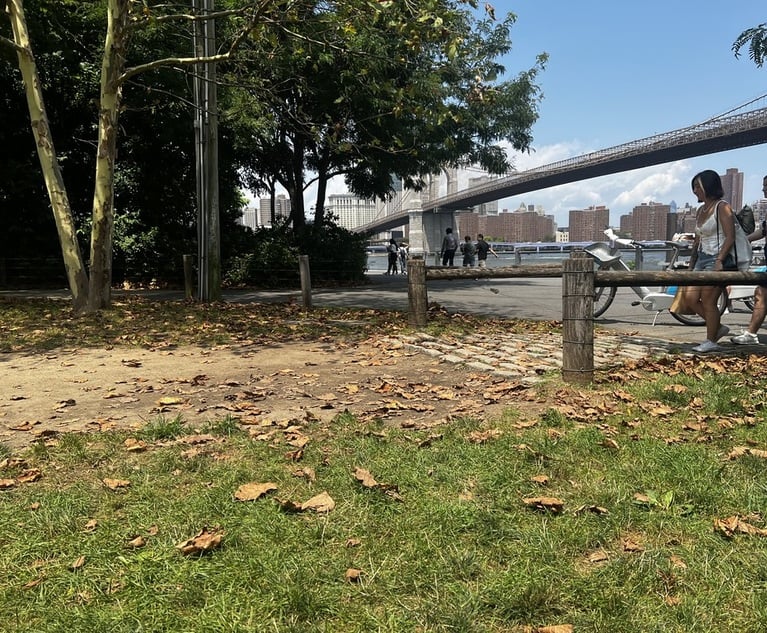 Photo: suriyachan/Shutterstock.com
Photo: suriyachan/Shutterstock.comEx-Columbia Doctor Can't Possess Women's Videotaped Depositions in Sex Abuse Suit, Judge Says
In what may be a novel ruling, a Manhattan state court judge has granted a protective order to four women suing a former gynecologist for alleged sexual abuse. “Plaintiffs ... fear that [the defendant] will use the recordings … for perverted sexual predatory purposes,” Justice Lucy Billings wrote in deciding to keep the taped depositions out of the former gynecologist's hands.
July 30, 2019 at 06:32 PM
7 minute read
In what may be a novel ruling in the state, a Manhattan Supreme Court judge has granted a protective order to four women suing a former gynecologist for alleged sexual abuse, disallowing the former gynecologist—and related entity defendants, including Columbia University—from possessing the women's upcoming videotaped depositions for any amount of time.
The ruling by Justice Lucy Billings does allow the defendants, including the former gynecologist, Robert Hadden, to view and listen to the video and audio deposition recordings. But the recordings must stay in the “exclusive possession, custody, and control” of the suit's defense and plaintiff lawyers, wrote Billings in a decision that covered the recordings issue in two long paragraphs.
“Plaintiffs claim Hadden is a perverted sexual predator who has sexually exploited and abused them and fear that he will use the recordings … for perverted sexual predatory purposes,” wrote Billings, also pointing out that Hadden has been convicted of a “related” sexual misconduct felony involving certain female patients.
“Hadden … insists that he will not use the recordings of plaintiffs' depositions for purposes other than the preparation of his defense,” Billings wrote.
She added, “No party shall disseminate or use the video or audio recording, the transcript, notes, or observations of any plaintiff's deposition except for the prosecution or defense of this action and related actions in the court.”
But “all parties still are permitted to attend the depositions and to view and listen to the recordings as long and as frequently as desired,” wrote Billings in the decision, which was issued last Friday but was made public Monday.
Hadden, the former gynecologist who for many years was affiliated with New York Presbyterian Hospital, Columbia University Medical Center, Columbia University and other entities, pleaded guilty in 2016 to criminal sexual misconduct and forcible touching in regard to two former patients, including one involved in the civil suit at issue. He also agreed to give up his medical license as part of the deal but received no jail time.
He now faces a string of sexual abuse civil suits, lodged by 25 former patients, including two who were minors at the time of the alleged abuse and some who were pregnant. The women and minor girls have set out a litany of alleged abuse that they say went on for years—including Hadden using the examination room setting to allegedly engage in vaginal-oral contact, digital penetration, grooming, groping, ogling, the giving out of unsolicited sexual advice and the taking of sexual histories.
Hadden's lawyer, Bill Vaslas of Vaslas Lepowsky Hauss & Danke, did not return a call and an email seeking comment.
According to Anthony T. DiPietro, the lawyer for the many women involved in the suits, Hadden and his attorneys served in June an “11th-hour” request for videotaped depositions in one of the suits.
That action, captioned Jane Doe #3, Jane Doe #4, Jane Doe #5, and Jane Doe #6 v. New York and Presbyterian Hospital, et al., involves four former Hadden patients, including one who was pregnant when the alleged abuse happened.
In a phone interview and email with the Law Journal, DiPietro argued that the request for videotaped depositions was “designed to harass and intimidate the women that Hadden had sexually exploited and abused while under his care.”
Defense counsel has called that argument “inflammatory and outrageous” in court papers.
DiPietro said that he made a motion for a protective order for several reasons. He and his clients feared, he said, that Hadden would “keep the videos in his basement” for years or decades and use them for deviant sexual satisfaction. There is also the worry that he may leak the videos publicly at some point, DiPietro said. And there is the psychological aspect of him possessing videos of women who DiPietro says have been deeply traumatized and would be re-traumatized knowing that Hadden had videos of them in his home and possession.
DiPietro said that some of the four plaintiffs asked him to make the motion and he had already thought it should be done.
“This is a very important legal decision for survivors of sexual abuse everywhere,” he added, noting that he was thankful for Billings' attention to the motion.
DiPietro also claimed that he had conducted detailed case law research on the issue of keeping from parties deposition discovery in the context of a sexual abuse lawsuit and there is “limited law [in New York State] on this.”
He and his clients had requested in their motion that Hadden and the entity defendants in the Jane Doe #3, et al. case also be prevented from even viewing or listening to the videos and audios of the forthcoming depositions.
Billings chose not to go that far. She wrote in her decision that “since no party has indicated any reason to use the recordings of plaintiffs' depositions for any purpose other than the prosecution or defense of this action and actions related to it, the court grants plaintiffs' motion to [a] … limited extent and otherwise denies their motion.”
“I think that's a reasonable compromise that the judge struck,” DiPietro said by phone.
Asked why his protective-order motion included the more than 10 entity defendants, along with defendant Trustees of Columbia University in the City of New York—as opposed to Hadden only—DiPietro said that for years certain other defendants had been trying to shut down the plaintiffs' action, and he and his clients feared one or more of them may give the videos or audios to Hadden.
In opposition papers filed by the Vaslas Lepowsky firm on behalf of Hadden, his attorneys wrote that “as a party to a civil action, Dr. Hadden has a statutory right to conduct a deposition of the other parties or witnesses and record the testimony.”
The papers also said, “Plaintiffs cite no case law where the court issued an order precluding a party to a lawsuit from accessing the material obtain[ed] through valid discovery devices. Plaintiffs could not cite any case law because there is no such case law.”
Continuing, Hadden's attorneys argued that “plaintiff's counsel asserted multiple allegations against Dr. Hadden, Co-Defendants, and their counsels, accusing them of 'grotesque and shameless efforts to bully and defame Plaintiffs.' These accusations are inflammatory and outrageous, but also groundless and unprofessional. The present action is very complex. and both sides are entitled to employ all the necessary, and available discovery means to prepare for trial.… There is no reason to believe that Dr. Hadden intends to use Plaintiff's depositions or their recordings for other purposes.”
Later in the same papers, under a section entitled, “A Lawyer Has No Legal Or Ethical Right To Prohibit His Client From Accessing The Discovery Materials Obtained On Client's Behalf,” Hadden's attorney pointed out that “defense counsel is not the owner of the client's file.”
Mark Zauderer, a veteran New York litigator and partner at Ganfer Shore Leeds & Zauderer, noted in an interview Tuesday that while he was not aware in the sexual abuse lawsuit context of protective orders keeping videotaped depositions in the hands of the attorneys only, he has seen such orders in commercial litigation numerous times.
Such orders are used in commercial cases, he said, “because often the parties are business competitors and the [deposition] information is commercially sensitive.”
“The same principle ought to apply here in that Justice Billings has permitted the lawyer to have and use the information,” Zauderer said, “but not permit the client to have it. It sounds like a solid ruling.”
Jay Rappaport of Aaronson Rappaport Feinstein & Deutsch represents the entity defendants and the Trustees of Columbia University in the lawsuit.
Reached on Tuesday, he declined to comment on Justice Billings' ruling, saying only, “We do not comment upon pending court actions.”
This content has been archived. It is available through our partners, LexisNexis® and Bloomberg Law.
To view this content, please continue to their sites.
Not a Lexis Subscriber?
Subscribe Now
Not a Bloomberg Law Subscriber?
Subscribe Now
NOT FOR REPRINT
© 2024 ALM Global, LLC, All Rights Reserved. Request academic re-use from www.copyright.com. All other uses, submit a request to [email protected]. For more information visit Asset & Logo Licensing.
You Might Like
View All
Decision of the Day: Judge Reduces $287M Jury Verdict Against Harley-Davidson in Wrongful Death Suit

Decision of the Day: Judge Denies Summary Judgment Motions in Suit by Runner Injured in Brooklyn Bridge Park

Decision of the Day: Administrative Court Finds Prevailing Wage Law Applies to Workers Who Cleaned NYC Subways During Pandemic

Trending Stories
- 1Decision of the Day: Judge Reduces $287M Jury Verdict Against Harley-Davidson in Wrongful Death Suit
- 2Kirkland to Covington: 2024's International Chart Toppers and Award Winners
- 3Decision of the Day: Judge Denies Summary Judgment Motions in Suit by Runner Injured in Brooklyn Bridge Park
- 4KISS, Profit Motive and Foreign Currency Contracts
- 512 Days of … Web Analytics
Who Got The Work
Michael G. Bongiorno, Andrew Scott Dulberg and Elizabeth E. Driscoll from Wilmer Cutler Pickering Hale and Dorr have stepped in to represent Symbotic Inc., an A.I.-enabled technology platform that focuses on increasing supply chain efficiency, and other defendants in a pending shareholder derivative lawsuit. The case, filed Oct. 2 in Massachusetts District Court by the Brown Law Firm on behalf of Stephen Austen, accuses certain officers and directors of misleading investors in regard to Symbotic's potential for margin growth by failing to disclose that the company was not equipped to timely deploy its systems or manage expenses through project delays. The case, assigned to U.S. District Judge Nathaniel M. Gorton, is 1:24-cv-12522, Austen v. Cohen et al.
Who Got The Work
Edmund Polubinski and Marie Killmond of Davis Polk & Wardwell have entered appearances for data platform software development company MongoDB and other defendants in a pending shareholder derivative lawsuit. The action, filed Oct. 7 in New York Southern District Court by the Brown Law Firm, accuses the company's directors and/or officers of falsely expressing confidence in the company’s restructuring of its sales incentive plan and downplaying the severity of decreases in its upfront commitments. The case is 1:24-cv-07594, Roy v. Ittycheria et al.
Who Got The Work
Amy O. Bruchs and Kurt F. Ellison of Michael Best & Friedrich have entered appearances for Epic Systems Corp. in a pending employment discrimination lawsuit. The suit was filed Sept. 7 in Wisconsin Western District Court by Levine Eisberner LLC and Siri & Glimstad on behalf of a project manager who claims that he was wrongfully terminated after applying for a religious exemption to the defendant's COVID-19 vaccine mandate. The case, assigned to U.S. Magistrate Judge Anita Marie Boor, is 3:24-cv-00630, Secker, Nathan v. Epic Systems Corporation.
Who Got The Work
David X. Sullivan, Thomas J. Finn and Gregory A. Hall from McCarter & English have entered appearances for Sunrun Installation Services in a pending civil rights lawsuit. The complaint was filed Sept. 4 in Connecticut District Court by attorney Robert M. Berke on behalf of former employee George Edward Steins, who was arrested and charged with employing an unregistered home improvement salesperson. The complaint alleges that had Sunrun informed the Connecticut Department of Consumer Protection that the plaintiff's employment had ended in 2017 and that he no longer held Sunrun's home improvement contractor license, he would not have been hit with charges, which were dismissed in May 2024. The case, assigned to U.S. District Judge Jeffrey A. Meyer, is 3:24-cv-01423, Steins v. Sunrun, Inc. et al.
Who Got The Work
Greenberg Traurig shareholder Joshua L. Raskin has entered an appearance for boohoo.com UK Ltd. in a pending patent infringement lawsuit. The suit, filed Sept. 3 in Texas Eastern District Court by Rozier Hardt McDonough on behalf of Alto Dynamics, asserts five patents related to an online shopping platform. The case, assigned to U.S. District Judge Rodney Gilstrap, is 2:24-cv-00719, Alto Dynamics, LLC v. boohoo.com UK Limited.
Featured Firms
Law Offices of Gary Martin Hays & Associates, P.C.
(470) 294-1674
Law Offices of Mark E. Salomone
(857) 444-6468
Smith & Hassler
(713) 739-1250






